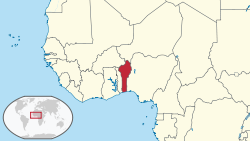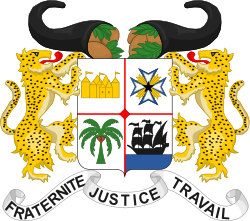The Flag of Benin


The following outline is provided as an overview of and topical guide to Benin:
Contents
- General reference
- Geography of Benin
- Location
- Environment of Benin
- Regions of Benin
- Demography of Benin
- Government and politics of Benin
- Branches of government
- Foreign relations of Benin
- Law and order in Benin
- Military of Benin
- History of Benin
- Dahomey
- Disasters in Benin
- Elections in Benin
- Culture of Benin
- Art in Benin
- Ethnic groups in Benin
- Languages of Benin
- Religion in Benin
- Sports in Benin
- Economy and infrastructure of Benin
- Education in Benin
- Health in Benin
- Beninese people
- See also
- References
- External links
- Government
- News
- Overviews
- Directories
- Tourism
Benin – country in West Africa. [1] It borders Togo to the west, Nigeria to the east and Burkina Faso and Niger to the north; its short coastline to the south leads to the Bight of Benin. Its capital is Porto Novo, but the seat of government is Cotonou. Benin was known as Dahomey until 1975.




